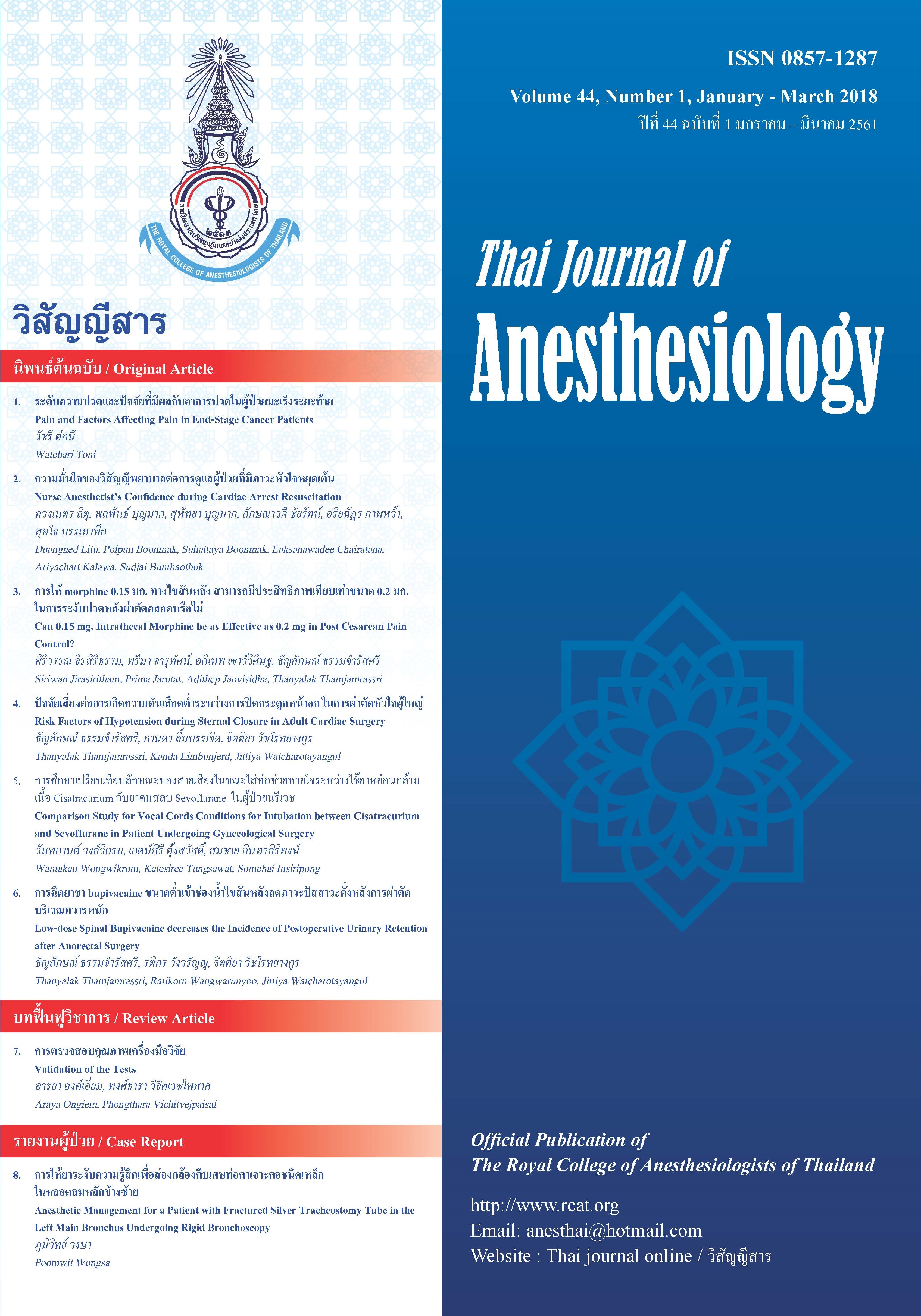Nurse Anesthetist’s Confidence during Cardiac Arrest Resuscitation
Main Article Content
บทคัดย่อ
Background: Perioperative cardiac arrest is an emergency condition. Nurse anesthetists play important role as a team member during perioperative cardiac arrest management. Objective of this study was to exam the nurse anesthetists’ confidence for cardiac arrest management and associated factors that influence on their confidence.
Methods: This study was a prospective description study in nurse anesthetists who worked at Anesthesiology department, Faculty of Medicine, Khon Kaen University, more than 6 months. Our questionnaire recorded their confidence level during cardiac arrest management
and associated factors that influence on their confidence.
Results: The response rate was 72.6 %. Most nurse anesthetists had confidence in basic life support, and advanced cardiac life support. Most of them did not have confidence in using defibrillator. We found the advanced life support training and PCR practice were associated with nurse anesthetist’ s confidence
Conclusion: Most nurse anesthetists had confidence in cardiac arrest management. We found advanced life support training was associated with their confidence.
Article Details
เอกสารอ้างอิง
59(6):586-603.
2.
Neumar RW, Shuster M, Callaway CW, et al. Part 1: executive summary: 2015 American Heart Association Guidelines Update for Cardiopulmonary Resuscitation and Emergency Cardiovascular Care. Circulation 2015;132(18)(suppl 2):
S315-67.
3.
Link MS, Berkow LC, Kudenchuk PJ, et al. Part 7: Adult Advanced Cardiovascular Life Support: 2015 American Heart Association Guidelines Update for Cardiopulmonary Resuscitation and Emergency Cardiovascular Care. Circulation 2015;132(18) (suppl 2): S444-64.
4.
Chanchayanon T, Suwanwong P, Nimmaanrat S. Outcome of in-hospital cardiopulmonary resuscitation and factors affecting the outcome at Songklanagarind Hospital. Songkla Med J 2011;29(1):39-49.
5.
Herlitz A, Bang S, Aune S, et al. Characteristics and outcome among patients suffering in-hospital cardiac arrest in monitored and non-monitored area. Resuscitation 2001;48(2):127-35.
6.
Nunnally ME, O’Connor MF, Kordylewski H, et al. The incidence and risk factors for perioperative cardiac arrest observed in the national anesthesia clinical outcomes registry. Anesth Analg 2015;120(2):364-70.
7.
Poomsawat S, Srichaipunha S, Boonmak P, et al. Evaluation of an ACLS training program for nurse anesthetist aims at role and satisfaction. Srinagarind Med J 2004;19(4):198-204.
8.
Mäkinen M, Niemi-Murola L, Kaila M, et al. Nurses’ attitudes towards resuscitation and national resuscitation guidelines-nurses hesitate to start CPR-D. Resuscitation 2009;80(12):
1399-1404.
9.
Roh YS, Issenberg SB, Chung HS. Ward nurses’ resuscitation of critical patients: current training and barriers. Eval Health Prof 2014;37(3):335-48.
10.
Hart PL, Spiva L, Baio P, et al. Medical-surgical nurses’ perceived self-confidence and leadership abilities as first responders in acute patient deterioration events. J Clin Nurs 2014;23(19-20):2769-78.
11.
Roth CK, Parfitt S, Brewer M. Effectiveness of an obstetrics-based Advanced Cardiac Life Support education program. J Obstet Gynecol Neonatal Nurs 2015;44(4):518-26.
12.
Boonmak P, Worphang N, Boonmak S, et al. Nurse’s Advanced Cardiac Life Support (ACLS) knowledge in Srinagarind Hospital. Srinagarind Med J 2010;25(1):42-6.
Boyde M, Wotton K. A review of nurses’ performance of cardiopulmonary resuscitation at cardiac arrests. J Nurses Staff Dev 2001;17(5):248–55.
14.
Stoss JK. Maintaining competency in advanced cardiac life support skill. J Am Med Assoc 1983; 249:3339-41.
15.
Seangnhern U, Uppanisakorn S, Chinnawong T. Factors related to nurses’ knowledge and skills in cardiopulmonary resuscitation in Songklanagarind Hospital. Songklanagarind Journal of Nursing 2012;32(1):1-10.
16.
Lyk-Jensen HT, Jepsen RM, Spanager L, et al. Assessing nurse Anaesthetists’ non-technical skills in the operating room. Acta Anaesthesiol Scand 2014;58(7):794-801.


